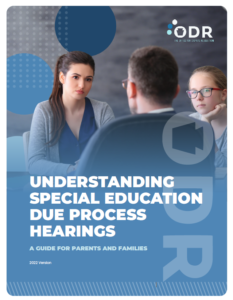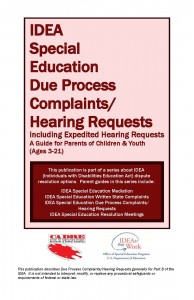Due Process
Due Process Hearing
You may request a special education due process hearing anytime you have concerns about your child’s program, placement, or evaluation and the provision of a free appropriate public education. A due process hearing is another way for parents or educational agencies to resolve educational disputes. Due process differs from other dispute resolution opportunities in that a Hearing Officer decides the dispute for the parties. Throughout the due process proceedings, resolution through mediation remains available to the parties. In addition, during the proceedings the parties may settle some or all of the issues among themselves at any time.
Due process hearings are similar to trials, with the Hearing Officer presiding and acting as a judge. An attorney will represent the educational agency. The parent may also be represented by an attorney, or may proceed without counsel. Witnesses are questioned and cross-examined, and evidence is admitted into the record for the Hearing Officer’s consideration. At the conclusion of the hearing, the Hearing Officer issues a written decision, which is a legally enforceable document setting forth the legal obligations of all the parties.
Understanding Special Education Due Process Hearings: A Guide for Parents and Families, is a helpful resource for parents who are considering or are involved in a due process hearing.
Parent and Family Guide (IDEA)

For parents of students who are eligible for gifted education, the guide Understanding Gifted Special Education Due Process Hearings: A Guide for Parents is available.
Requesting a Due Process Hearing
When requesting a due process hearing, you or your lawyer must make a written request to school officials and the Office for Dispute Resolution (ODR). This request must include the following information:
- The name and address of the child and the name of the school the child attends
- A description of the problem
- A proposed solution to the problem
ODR has developed a form that can be used to file for a due process hearing. This form is called a Due Process Complaint Notice. It is available through your school district’s administrative office, your procedural safeguards notice and this website.
Due Process Request Form.
Preschool and School Age Due Process Request Form
Due Process Video Series
This video series provides an overview of what to expect if you are involved in a special education due process hearing. The first video addresses prehearing matters, the second video discusses preparing for the hearing, and the third and fourth videos talk about the hearing itself.
Prehearing Matters
Preparing for the Hearing
During the Hearing
Understanding and Participating in the Hearing
Procedures
Within 15 days of receiving notice of your complaint and before a hearing is held, the school district must hold a resolution session for you and school officials to provide an opportunity to resolve your complaint, unless both you and the school agree in writing to waive this meeting or agree to use mediation.
If your complaint has not been resolved to your satisfaction within 30 days of the school receiving the due process complaint notice, a hearing may occur before an impartial hearing officer. The hearing officer cannot work for the school district or local intermediate unit. You may be represented by legal counsel or you may represent yourself. You may also be accompanied and advised by any individuals whom you believe would be knowledgeable or helpful to you during the hearing.
Each side may have witnesses and may ask questions of the other side’s witnesses. Prior to the hearing date, you may ask the hearing officer to subpoena anyone from the school district whom you believe has information important to your case. Witnesses testify under oath.
Both sides may give the hearing officer written material to consider. A list of material to be used at a hearing must be given to the other side at least five business days before the hearing. Any information given to the hearing officer to consider must also be given to the school district.
The hearing must be held at a reasonably convenient time and place for you. The hearing will be closed to the public unless you ask the hearing officer to open the hearing to the public. A transcript of what was said during the hearing will be made available upon your request.
The hearing officer will listen to both sides and then make a written decision. The decision will be mailed to you and to school officials within 45 calendar days after the receipt of your request for the hearing, unless an extension has been granted by the hearing officer.
If you prevail in a due process hearing, it can be decided by the courts that your attorney’s fees will be paid by the school district. Parents may be ordered to pay the district’s costs if it is found they pursued a complaint to harass, cause unnecessary delay, or needlessly increase costs to the district.
Due Process Fact Sheets
Timelines for due process can differ if your hearing is in regards to extended school year or discipline. Please review the appropriate Due Process Fact Sheet to learn morea bout timelines and additional due process procedure
Due Process Fact Sheet
When a parent requests a due process hearing, the school must hold a Resolution Meeting unless both parties waive the meeting. ODR offers Resolution Meeting Facilitation as another alternative to resolve the dispute. Read more about it on the Parent Resource Library and on the Resolution Meeting Facilitation page on ODR’s website.
CADRE, the National Center for Dispute Resolution in Special Education, has developed guides for parents on various dispute resolution topics. The guides were written with the support of parent leaders from across the country. Please note that these documents were not developed by ODR and therefore do not include Pennsylvania-specific regulations and procedures.
IDEA Special Education Due Process Complaints/Hearing Requests: A Guide for Parents of Children and Youth (Ages 3-21)

